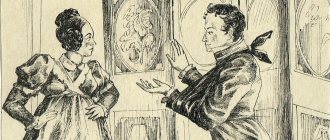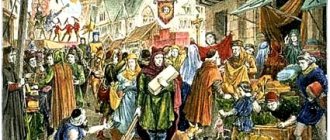My attitude towards Evgeny Onegin
The action of the novel "Eugene Onegin" develops in 1819 - 1825. It was at this time, saturated with major political events in the history of Russia and Europe, that a type of person similar to the hero of A. S. Pushkin’s novel “Eugene Onegin” emerged.
Pushkin took the character of the main character from life, summarizing traits typical of a whole generation of young people. These are people supported by the labor of serfs, who received a disorderly upbringing and education. But, unlike most representatives of the ruling class, these young people - more intelligent, sensitive and noble - experienced dissatisfaction and dissatisfaction with themselves. They stood out sharply, seemed somehow strange in society, but they themselves continued to lead an empty social life, well aware of its meaninglessness and experiencing nothing but boredom and mental suffering.
The main character of the novel is the young landowner Evgeny Onegin. He is shown by Pushkin as a person with a very complex and contradictory character.
Social status and upbringing determined the main character traits of Onegin. He is the son of a rich master, “the heir of all his relatives.” He did not need to work for a piece of bread, “he was sick of persistent work.” The upbringing Evgeniy received was the worst. He grew up without a mother. The father, a frivolous gentleman and official, did not pay any attention to his son, entrusting him to hired tutors and governesses. They taught the boy almost nothing, did not educate him in any way, and only slightly scolded him for his pranks. But having received the most superficial education, Onegin twice tried to replenish and expand it. In any case, having met with Lensky, who received a higher education at the best university in Germany, Onegin could argue with him on serious political, historical and philosophical issues as equal to equal.
In St. Petersburg, Onegin leads an empty, aimless and meaningless life. Meeting with friends in a restaurant, visiting the theater, balls, courting women. The science of tender passion was the main content of his life.
How early could he be a hypocrite?
To harbor hope, to be jealous,
To dissuade, to make believe,
Seem gloomy, languish.
Tired of being bored in St. Petersburg, Onegin goes to the village to be bored. And here his life is not distinguished by a wealth of events: swimming in the river, horseback riding and walking, reading magazines, kissing serf girls. No serious interests, no work. Only at first, having arrived in the village, Onegin tried to take up farming and eased the situation of the peasants: “He replaced the ancient corvée with a light quitrent.” But this did not occupy him for long, and Onegin took up this only out of idleness.
It is no wonder that Onegin turned out to be a real egoist, thinking only about himself, about his desires and pleasures, unable to pay attention to the feelings, interests and suffering of people, capable of easily offending, insulting, causing grief to a person without even noticing it. However, this is not a smug, self-loving egoist, but, as V. G. Belinsky called Onegin, a “suffering egoist.” He understands that the main source of his melancholy is the lack of activity and labor. But the good inclinations of his soul, due to his upbringing and living situation, remained hidden and did not receive development.
Onegin was not satisfied with an empty, meaningless life. The blues took over him. But he did not have enough strength or desire to break with this life, he continues to have the same passive and indifferent attitude towards everyone and everything except his own peace of mind. Having received a challenge to a duel, well aware of his wrongness and the meaninglessness of this fight, Onegin nevertheless accepts the challenge and kills his young friend Vladimir Lensky.
The murder of Lensky turned Onegin's whole life upside down. He is no longer able to remain living in those places where everything reminded him of his terrible crime, “Where the bloody shadow appeared to him every day.” And, tormented by remorse, Onegin rushes around the world. He can no longer go through life, as before, ignoring the feelings and experiences of the people he encounters. Now he can feel and love.
Returning after the trip, Onegin meets with Tatyana again. Love of unprecedented power flares up in Evgeniy’s soul. The strength of his feelings is such that he becomes seriously ill and almost dies of love.
How far this man, deeply experiencing his love, is from Onegin from the first chapters of the novel! How much the emotional turmoil he experienced affected him!
And here Onegin suffers the final collapse of his hopes for personal happiness, but the love catastrophe should resurrect his soul for new suffering, “more consistent with human dignity.”
My attitude towards Onegin is contradictory and changes as the plot develops. Onegin the egoist, bored in the first chapters of the novel, cannot, of course, evoke sympathy. And Onegin, reading a moral to the loving Tatiana, causes indignation. How easily he can harm people just like that, out of boredom. And how easily he is able to take the life of another person, fearing the imaginary condemnation of a society that is alien to him. Is Onegin capable of arousing sympathy in these scenes?
But, as renewal takes place in Onegin’s soul, my attitude towards him changes. I already feel sorry for him, sorry as a person who is essentially noble. The collapse of all his hopes, his personal misfortune are fair, this is retribution for his entire aimlessly lived life. Perhaps this will lead him to the right path, the path of fighting for the happiness of the people?
For Pushkin, the criterion of human value lies, firstly, in the desire for freedom, personal and social; secondly, in the desire for creativity, sensitivity to poetry, art (an irresistible passion to create was always a positive sign for Pushkin); thirdly, love is like the beauty of the spirit, its high aspiration.
Freedom, creativity, love - three elements of the spirit that are beautiful in a person, three passions that make him a truly noble being, three spheres of activity that fill life with meaning and meaning.
All of them could have been accessible to Onegin, but they were all drowned out in him by his environment, upbringing, and living conditions. Onegin is alien to the high passion of freedom, as well as the passion of creativity, poetry, he is incapable of sublime love.
This is not Onegin’s fault, but Onegin’s misfortune. Onegin's guilt is involuntary, tragic. Onegin's wines are the wines of light. The blame lies with a society that is so unfairly structured.
Evgeny Onegin did not find his place in life. He broke away from secular society, but did not join any other. “Secular life did not kill Onegin’s feelings, but only cooled him to fruitless passions and petty entertainments... Onegin did not like to get lost in dreams, he felt more than he spoke, and did not open up to everyone. An embittered mind is also a sign of a higher nature... but the powers of this rich nature were left without application, life without meaning,” V. G. Belinsky wrote about Onegin.
“My attitude towards Eugene Onegin (based on the novel by A. S. Pushkin)”
The action of the novel "Eugene Onegin" develops in the years 1819-1825. It was at this time, saturated with major political events in the history of Russia and Europe, that a type of person similar to the hero of A. S. Pushkin’s novel “Eugene Onegin” emerged. Pushkin took the character of the main character from life, summarizing traits typical of an entire generation of young people. These are wealthy, well-mannered and educated people. But, unlike most representatives of the ruling class, these young people - more intelligent, sensitive and noble - experienced dissatisfaction and dissatisfaction with themselves. They stood out sharply and seemed somehow strange in society. They themselves continued to lead an empty social life, well understanding its emptiness and experiencing nothing but boredom and mental suffering. The main character of the novel is the young landowner Evgeny Onegin. He is shown by Pushkin as a person with a very complex and contradictory character. Social status and upbringing determined the main character traits of Onegin. He is the son of a rich master, “the heir of all his relatives.” He didn’t need to work, “he was sick of persistent work.”
The upbringing Evgeniy received was the worst. He grew up without a mother. The father, a frivolous gentleman and official, did not pay any attention to his son, entrusting him to hired tutors and governesses. But, having received the most superficial education, Onegin twice tried to replenish and expand it. In any case, having met Lensky, who studied at the best university in Germany, Onegin could argue with him, discussing serious political, historical and philosophical issues.
In St. Petersburg, Onegin leads an empty, aimless life. Meeting with friends in a restaurant, visiting the theater, balls, courting women. “The science of tender passion” was the main content of his life.
How early he could be a hypocrite, conceal hope, be jealous, dissuade, force to believe, seem gloomy, languish.
Tired of being bored in St. Petersburg, Onegin goes to the village. And here his life is not distinguished by a variety of events: swimming in the river, walking, reading magazines. No serious interests, no work. Only at first, having arrived in the village, Onegin tried to take up farming and eased the situation of the peasants: “He replaced the ancient corvée with a light quitrent.” But, having taken up this out of idleness, Onegin quickly lost interest in his hobby.
Onegin appears before the reader as a person who thinks only about himself, about his desires and pleasures, who does not know how to pay attention to the feelings, interests and suffering of people, who can easily offend, insult, and cause grief to a person without even noticing it.
However, this is not a smug, self-loving egoist, but, as V. G. Belinsky called Onegin, a “suffering egoist.” He understands that the main source of his melancholy is the lack of activity and labor. But the best qualities of his soul do not receive development. Onegin is not satisfied with an empty, meaningless life. The melancholy has taken possession of him, but he has neither the strength nor the desire to change his life, he continues to have the same passive and indifferent attitude towards everyone and everything.
Having received a challenge to a duel, well aware of his wrongness and the meaninglessness of this fight, Onegin nevertheless accepts the challenge and kills his young friend Vladimir Lensky. The murder of Lensky turned Onegin's whole life upside down. He is no longer able to live in those places where everything reminds him of his terrible crime, “where the bloody shadow appeared to him every day.” Tormented by remorse, Onegin rushes around the world. He can no longer, as before, ignore the feelings and experiences of the people he encounters. Now he can feel and love.
Returning after the trip, Onegin meets with Tatyana again. Love of unprecedented power flares up in Evgeniy’s soul. The strength of his feelings is such that he becomes seriously ill. How much the emotional turmoil he experienced affected him! And here Onegin suffers the final collapse of his hopes for personal happiness, but the love catastrophe should resurrect his soul for new suffering, “more consistent with human dignity.”
My attitude towards Onegin is contradictory and changes as the plot develops. Onegin the egoist, bored, as we see him in the first chapters of the novel, cannot, of course, evoke sympathy. And Onegin, reading a moral to the loving Tatiana, causes indignation. How easily he can harm people! And how easily he is able to take the life of another person, fearing the imaginary condemnation of a society that is alien to him. Is Onegin capable of arousing sympathy in these scenes?
But as renewal takes place in Onegin’s soul, my attitude towards him changes. I already feel sorry for him, I feel sorry for him as an essentially noble person. Personal misfortune, the collapse of all his hopes, is retribution for his entire aimlessly lived life. Perhaps this will lead him on the right path?
For Pushkin, the criterion of human value lies, firstly, in the desire for freedom, personal and social; secondly, in the desire for creativity, sensitivity to poetry, art (an irresistible passion to create was always a positive sign for Pushkin); thirdly, in love, the beauty of the spirit, its high aspiration. Freedom, creativity, love - three elements of the spirit, three passions that make a person a truly noble being, three spheres of activity that fill life with meaning and meaning. All of them could be available to Onegin, but they are all suppressed in him by his environment, upbringing, and living conditions.
Onegin's guilt is involuntary, tragic. This is the fault of society, which is so unfairly structured. Evgeny Onegin did not find his place in life. He broke away from secular society, but did not join any other. “Secular life did not kill Onegin’s feelings, but only cooled him to fruitless passions and petty entertainments... Onegin did not like to get lost in dreams, he felt more than he spoke, and did not open up to everyone. An embittered mind is also a sign of a higher nature... but the powers of this rich nature were left without application, life without meaning,” V. G. Belinsky wrote about Onegin.






